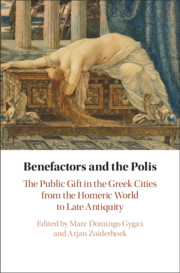 Benefactors and the Polis
Benefactors and the Polis Book contents
- Benefactors and the Polis
- Benefactors and the Polis
- Copyright page
- Contents
- Figures
- Tables
- Contributors
- Acknowledgements
- Abbreviations
- Introduction
- Part I Benefiting the Community in Early Greece
- Part II Classical Benefactors
- Part III Hellenistic Benefactors
- Chapter 5 The Politics of Endowments
- Chapter 6 ‘To be magnanimous and grateful’
- Chapter 7 Socially Embedded Benefaction on Delos
- Part IV Benefactors and the Polis under Rome
- Part V The Decline and Fall of Euergetism?
- Conclusion
- Index
- Index locorum
- References
Chapter 5 - The Politics of Endowments
from Part III - Hellenistic Benefactors
Published online by Cambridge University Press: 21 January 2021
- Benefactors and the Polis
- Benefactors and the Polis
- Copyright page
- Contents
- Figures
- Tables
- Contributors
- Acknowledgements
- Abbreviations
- Introduction
- Part I Benefiting the Community in Early Greece
- Part II Classical Benefactors
- Part III Hellenistic Benefactors
- Chapter 5 The Politics of Endowments
- Chapter 6 ‘To be magnanimous and grateful’
- Chapter 7 Socially Embedded Benefaction on Delos
- Part IV Benefactors and the Polis under Rome
- Part V The Decline and Fall of Euergetism?
- Conclusion
- Index
- Index locorum
- References
Summary
This chapter argues that euergetism in Hellenistic poleis was not just a form of benefaction securing kings and wealthy members of the polis symbolic capital, legitimacy and a superior place in the social hierarchy of poleis, but also a means of community building and social peace. The well-known habit of Hellenistic political communities to publish endowment decrees and the regulations concerning their legal execution on stone not only ensured that the assets dedicated to a particular purpose were not poorly managed, embezzled or transferred to another purpose. They were also public monuments of the democratic control over private wealth and its public display. Demonstrating that the people held ultimate power over the smooth running of public endowments, these decrees guaranteed and made visible the democratic commitment to their ‘eternal’ existence, and at the same time propagated the effectiveness of democratic institutions among the whole citizen body as well as vis-à-vis individual wealthy benefactors.
Keywords
- Type
- Chapter
- Information
- Benefactors and the PolisThe Public Gift in the Greek Cities from the Homeric World to Late Antiquity, pp. 115 - 136Publisher: Cambridge University PressPrint publication year: 2021
